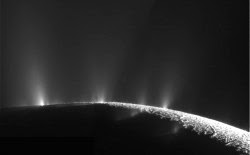Every planets have its own uniqueness and for example earth is able to occupied life. Saturn does not have earth uniqueness but as a gaseous planet which is least dense, Saturn will be like a titanic that can float in the water.
Moreover, it beautiful ring system makes Saturn like a lady with jewelry. It does not have just one or two ring but four sections for exact. Every rings that circle around Saturn are named by alphabet. On the Voyager mission, F was discovered and it is the farthest out. Next is the A section which is half the diameter of the entire system. When Cassini Division satellite arrive at Saturn, it capture a large gap between A and B sections. B has raised parts that is cause by Saturn's magnetism. In between B and C there is a small divison called Enck's Division but the C is most likely transparent.
 |
| Saturn rings |
The rings are usually occupied with water ice and a trace component of rocky material. But like other gas giants planets, Saturn's rings system would not last long as most of the rings will fall into the planet's atmosphere.
Furthermore this giant planet also able to generates heat. Its average temperature is approximately about 80 K. The gases in Saturn's atmosphere are slowly separating, with the lighter gas rising up and the heavier gas falling down. As this happens, friction between the molecules heats the gas, accounting for the extra heat.
Amazingly when NASA’s Cassini spacecraft recently pass through Enceladus, one of Saturn's moons, it discovered ice geysers blasting out of Enceladus’ southern pole. This fascinating discovery means that there are some process that is keeping the moon warm enough so that water can remain a liquid underneath the surface. This means that it is probably occupied with living things!
 |
| Water vapour geysers on Enceladus |
Well other than Enceladus, Saturn itself are not able to sustain life because it has no oxygen and has poisonous gases in which no life can survive. Plus the pressure is a lot greater than Earth.
No comments:
Post a Comment